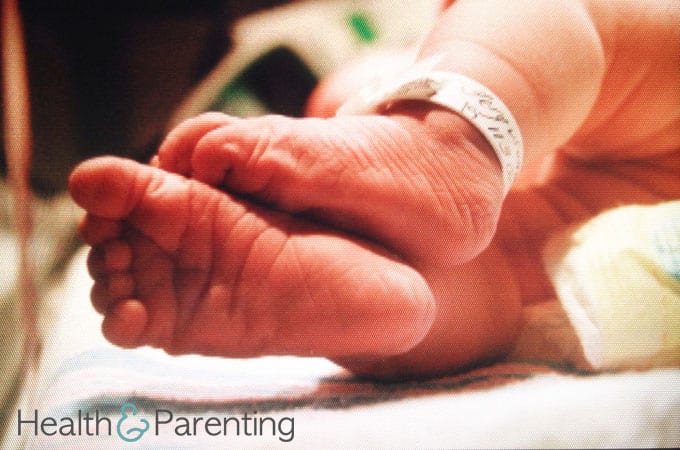Once labor and delivery has occurred, you will hear your doctors and attending pediatricians talking about the APGAR score. The APGAR test – which stands for A: Appearance (Skin color) * P: Pulse (Heart rate) * G: Grimace (Reflex irritability) * A: Activity (Muscle tone) * R: Respiration (Breathing) – will take place at 1 minute, 5 minutes and 10 minutes after delivery. Chances are while your baby is being assessed you will still be delivering the placenta and afterbirth.
During the APGAR test, your baby will be given a score of 0, 1 or 2 in each of the five categories. For instance if their skin is pink all over, they will receive 2 points. If their skin is pale or blue – they will be given 0 points. Once all the points in each of the categories is added up, a final tally is made. A score of 7 points or more at the 1 minute mark is considered normal and means that your baby does not need any immediate medical attention. Scores of lower than 7, normally mean that a NICU nurse or pediatrician will be called in to help.
Oftentimes, a baby’s APGAR score will improve greatly between the 1 minute and 10 minute mark. In fact, your baby may have a low or risky score at the 1 minute mark and a completely normal (or even perfect) score at the 10 minute mark. Much of this depends on the type of delivery and any problems or complications that may have occurred during childbirth.
The APGAR test, while not diagnostic, was invented in the early 1950’s as an easy way for physicians to quickly assess the needs of newborns. The good news is that a low APGAR score at any of the timed intervals does not mean that your baby will have any long term health problems. Most of these problems can be resolved in a matter of minutes, hours or days. The test is a preliminary screening, and is essentially used to decide whether your baby needs further medical intervention.
The APGAR test is the first in a long line of tests that your baby will receive once delivered. As part of your birthing plan, you may want to designate a family member, spouse, loved one or friend to stand by with your baby when these tests are performed since you will likely be recovering. Hearing your baby’s APGAR scores are normal will help you relax and recover from the birth.
Written By Stef, Mom of 4 @Momspirational
This information is not intended to replace the advice of a trained medical doctor. Health & Parenting Ltd disclaims any liability for the decisions you make based on this information, which is provided to you on a general information basis only and not as a substitute for personalized medical advice. All contents copyright © Health & Parenting Ltd 2017. All rights reserved.












